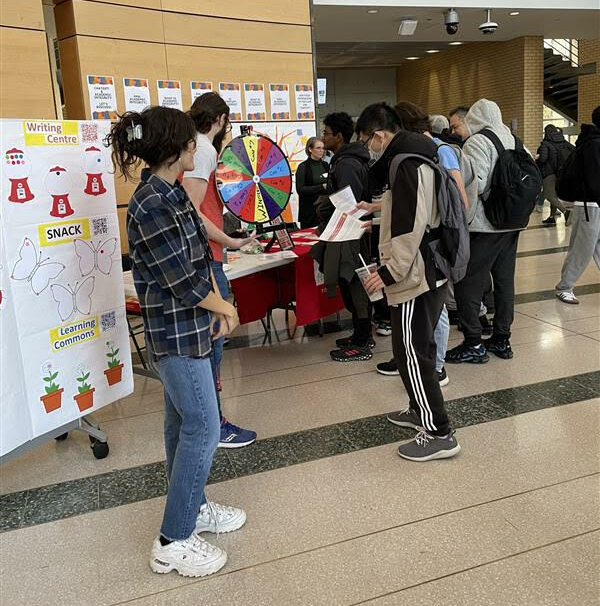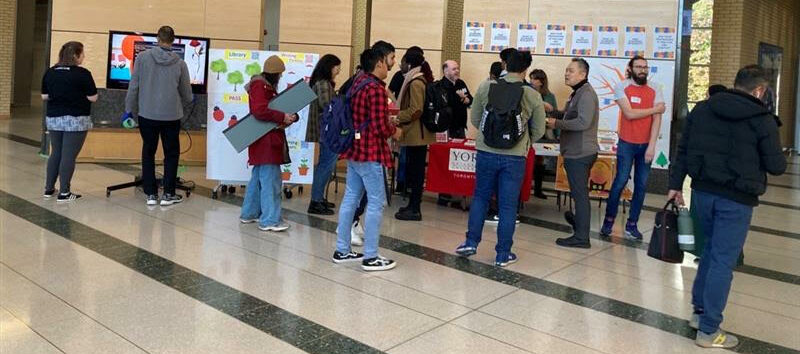
By Elaine Smith
With generative artificial intelligence (AI) top of mind for many members of the York community these days, the Faculty of Liberal Arts & Professional Studies (LA&PS) decided that Academic Honesty/Integrity Month was a perfect opportunity to discuss the topic with students.
LA&PS held a tabling event at Vari Hall on Oct. 24 to educate students about generative AI, address the current parameters for using it in courses and build digital literacy around these emerging tools. They also posed scenarios involving AI so students could consider what is appropriate in various contexts. Approximately 150 students stopped to talk with faculty and staff on hand.
“We’re really thinking about being proactive and connecting with students around academic honesty and AI in more engaging ways,” said Mary Chaktsiris, a historian and associate director of teaching innovation and academic honesty for LA&PS. “We hope that as a result of this event, students will reach out to instructors to talk about generative AI and connect with available supports at York.”

Chaktsiris and the LA&PS academic honesty team co-led the Vari Hall event with Stevie Bell, head of McLaughlin College and an associate professor with the Writing Department. They had support from Michelle Smith, a learning innovation specialist, and academic honesty co-ordinators Namki Kang and Angelica McManus. Neil Buckley, associate dean of teaching and learning, and knowledgeable representatives from the Writing Centre, Peer-Assisted Study Sessions (PASS) and Student Numeracy Assistance Centre (SNACK) instructional teams were also on hand to converse with students.
“We wanted students to get the facts about academic honesty and give them some guidance regarding AI now that the York Senate’s Academic Standards, Curriculum and Pedagogy (ASCP) Committee has given a policy clarification,” said Buckley. “It was an opportunity to inform students about this, because every student experiences AI in different contexts, and this is a domain that will be growing and growing.”
ASCP states that “Students across York are not authorized to use text-, image-, code- or video-generating tools when completing their academic work unless explicitly permitted by a specific instructor in a particular course.” As part of a regular review process, a newly revised Senate Policy on Academic Honesty is expected to be announced in coming months.
Bell noted, “In my experience with academic honesty since I began teaching writing in 2002, I’ve never found a student who wanted to cheat; they want to find out how to do things correctly.
“So, we brought the conversation to Vari Hall. We wanted this event to be an inviting space for students to discuss AI openly, because the landscape is shifting. In some courses, professors suggest that students use it to do specific tasks, while in other courses, it’s a no-go zone. We wanted students to know how to talk to their professors about it. From talking to students in the Writing Department, I know they are very confused about if, when and how to use AI, so this was very generative for all.”

Students had a variety of concerns to share at Vari Hall. Some wanted to talk specifically about academic honesty, but others wanted to discuss generative AI more specifically. Faculty, too, are exploring AI, Buckley noted. For example, the Teaching Commons has a community of practice dedicated to discussing AI and how it is being used across campus and recently held a Summit on Generative AI in Higher Education. With the use of AI expected to grow exponentially in the workplace, understanding how to use generative AI will be essential.
“AI is already a tool in the workplace,” Bell said. “If you look at job postings on the Indeed site, for example, many of them request experience in using generative AI technology productively. As a result, in the Writing Centre, we’re looking at building digital literacies. Students need to understand generative AI’s incentives and motivations to tell you what you want to hear, and they need to learn to fact check.
“The questions can become very nuanced. For instance, are you giving away a company’s proprietary information if you use it?”
The success of the Vari Hall event inspired the LA&PS team and they would like to see the conversation continue. Bell has begun holding ongoing workshops at the Writing Centre with a student focus; the first one drew 75 people, including teaching assistants.
“From a pedagogical perspective, connection and conversation are important parts of navigating the emergent aspects of AI,” Chaktsiris said. “More connections with students will be important to building digital literacies and helping navigate the shifting contexts of generative AI. A focus on connection and support also leans into more inclusive pedagogical practice. I hope there are more touch points for us to discuss AI and academic honesty more generally.”
Students who have questions can turn to available LA&PS resources such as the Writing Centre, PASS, SNACK, peer mentors, academic advising and academic honesty co-ordinators to discuss generative AI and academic honesty in more detail.
